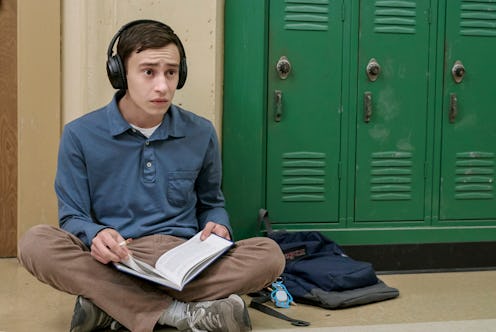
Atypical tells the story of an autistic teen, but it isn't a show about autism. The new Netflix series, which debuted on Aug. 11, follows high school outcast Sam as he begins to unshackle himself from his parents, embrace more independence, and, for the first time, take the awkward plunge into dating. Much of the narrative delves into the unique challenges that come with being autistic, but Atypical star Keir Gilchrist says that it's ultimately a show about coming of age.
"The thing about the show, and this is always how it was presented to me, is that it’s a coming-of-age story about a kid who is an outsider at school. I don’t think anyone was setting out to make the show about autism or anything. We wanted to tell a story of a character," he says.
That's an important distinction to make, given the criticism that's already begun to bubble up around the series. The response from the autism community has been mixed, with some praising Atypical's willingness to tackle a perspective rarely seen on television — especially at this scale — and others lamenting its failure to push the character beyond a familiar caricature. It also represents a specific and perhaps limited point of view: Gilchrist isn't autistic himself, and Sam is white, male, and heterosexual, much like the vast majority of autistic characters that have already been seen in film and on TV.
Gilchrist, for his part, acknowledges those concerns, but hopes that the series can transcend its potential shortcomings. "I hope that people on the spectrum can relate and see something of themselves," he says. "Obviously not everyone’s experience is the same, but I hope that it’s exciting to see a show where they’re being represented and I hope that it makes people think, 'Oh, I could write something about my situation or what I’ve learned in my experiences.' And I also hope that it’s funny and it makes people laugh and it makes people cry, because I think there are times you want to do both."
According to USA Today, the Atypical team consulted an advisor with a clinical background in the behavior of autistic children, while Gilchrist reflected back to his childhood neighbors — two autistic kids — and immersed himself in The Journal of Best Practices, an illuminating account of author David Finch's experience with Asperger's.
"All I can say is I just auditioned and did the best that I could, and thankfully [Atypical creator Robia Rashid] took a chance on me. I know that people both on and off the spectrum auditioned for the role, but as far as why I was cast over someone else is kind of a hard answer to give, for me," Gilchrist says. "I think that I tried my best and Robia did too. I’m really honored to have been given the opportunity, and I just took it as another acting challenge. I’ve played lots of characters that weren’t necessarily exactly like me, but I definitely understand why people are concerned about that."
Still, Sam did resonate with Gilchrist on a personal (albeit less direct) level. "I definitely felt like an outsider in high school and had similar feelings of walking down the hall and not making eye contact with anyone," he says. "I was the weird punk kid, kind of the only one in my school that didn’t have a ton of friends. And I was an actor, which is always a very weird thing. It immediately kind of sets you apart from everybody else at school."
It's that feeling, Gilchrist says, that's at the heart of Atypical. "I think that’s the side of the story that I loved the most. It’s this band of outsiders who form this friend group and don’t conform," he says. "Everybody’s weird whether they let themselves embrace that or not ... [But] the way of getting around being an outsider is not to just conform to what everyone else wants you to be, it’s to find some other people that also find themselves in that position and create your own thing, and you end up being a lot cooler than all the people you went to high school with anyway."
Gilchrist hopes viewers will see that bravery and individuality in Sam, too.